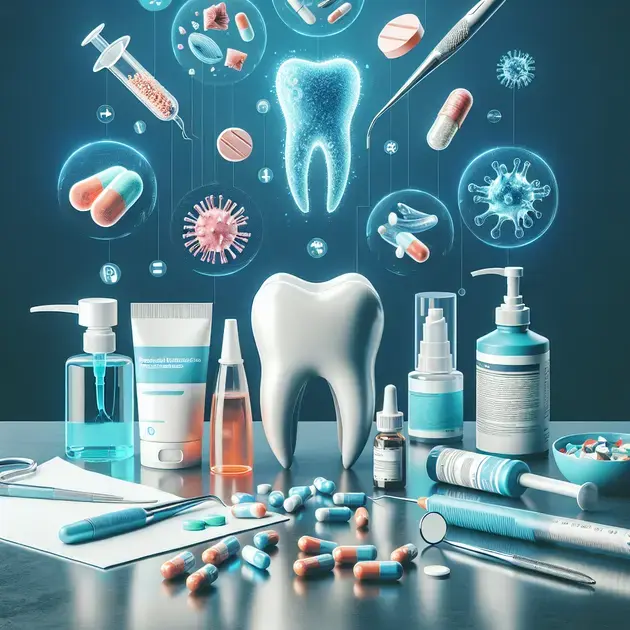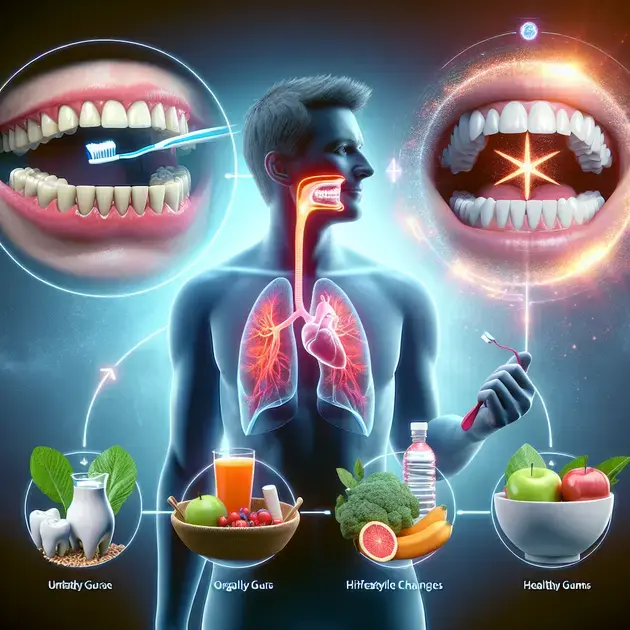Looking for effective medication for periodontitis? You’ve come to the right place! This comprehensive guide will provide you with everything you need to know about treating this common condition.
Periodontitis is a serious gum infection that damages the soft tissue and destroys the bone that supports your teeth. Without proper treatment, periodontitis can lead to tooth loss and other complications. Fortunately, with the right medication and proper care, you can manage and even reverse the effects of this condition.

Effective Medication Options for Periodontitis
When it comes to treating periodontitis, there are several effective medication options available that can help manage and control the symptoms of this condition. One common medication is antibiotics, which can be prescribed by a dentist or periodontist to help eliminate the bacteria causing the infection.
Another medication option for periodontitis is antimicrobial mouth rinses. These rinses contain ingredients that can help reduce the bacterial load in the mouth, promoting healing and preventing further progression of the disease.
For more severe cases of periodontitis, a dentist may recommend systemic antibiotics. These are antibiotics that are taken orally and work throughout the body to combat the infection from within.
In addition to medications, it’s important to maintain good oral hygiene practices, such as regular brushing, flossing, and dental cleanings. These habits can help prevent the progression of periodontitis and support the effectiveness of the medications prescribed.
Understanding Periodontitis Treatment
Periodontitis treatment typically involves a combination of professional dental care and at-home management. One common treatment method is scaling and root planing, a deep cleaning procedure that removes plaque and tartar from the teeth and roots.
Another aspect of periodontitis treatment is the use of surgical interventions, such as flap surgery or bone grafts, to help restore damaged gum and bone tissue. These procedures can help reduce pocket depths and promote better oral health.
Some patients may also benefit from laser therapy as part of their periodontitis treatment. This non-invasive procedure uses concentrated light energy to target and remove diseased tissue, promoting healing and reducing inflammation.
It’s essential for individuals undergoing periodontitis treatment to follow their dentist’s recommendations closely and to attend regular follow-up appointments. Monitoring progress and making necessary adjustments to the treatment plan are crucial to achieving optimal outcomes.
Tips for Managing Periodontitis Symptoms
Managing the symptoms of periodontitis involves a combination of lifestyle changes and oral care practices. One important tip is to quit smoking, as smoking can worsen gum disease and decrease the effectiveness of treatment.
Another helpful tip is to maintain a balanced diet rich in vitamins and minerals that support gum health, such as vitamin C and calcium. Avoiding sugary and processed foods can also help reduce inflammation and support overall oral health.
Regular exercise can also play a role in managing periodontitis symptoms, as physical activity can help boost the immune system and reduce inflammation in the body. Aim for at least 30 minutes of moderate exercise most days of the week.
In addition to these lifestyle changes, it’s important to stick to a consistent oral hygiene routine, including brushing at least twice a day and flossing daily. Using an antiseptic mouthwash can also help reduce bacteria in the mouth and support gum health.

Effective Medication Options for Periodontitis
When it comes to treating periodontitis effectively, there are several medication options available that can help manage the condition and improve oral health. One common medication prescribed for periodontitis is antibiotics. These can be taken orally or applied directly to the gum tissue to target and eliminate the bacteria causing the infection. Another medication option is antimicrobial mouth rinses, which can help reduce plaque and prevent bacterial growth in the mouth.
In more severe cases of periodontitis, a dentist may recommend systemic antibiotics, which are taken by mouth and travel through the bloodstream to reach infected areas in the gums. These antibiotics can help control the infection and promote healing. Additionally, some patients may benefit from antibiotic microspheres, which are tiny particles placed in gum pockets to deliver antibiotics directly to the affected areas.
For those looking for a more natural approach, certain essential oils have been found to have antimicrobial properties that can help fight the bacteria associated with periodontitis. Tea tree oil, for example, has been shown to inhibit the growth of bacteria and reduce inflammation in the gums when used as a mouthwash or applied topically.
Overall, the choice of medication for periodontitis treatment will depend on the severity of the condition, the patient’s medical history, and any other underlying health issues. It is important to consult with a dentist or periodontist to determine the most effective medication options for individual needs.
Understanding Periodontitis Treatment
Periodontitis is a serious gum infection that can lead to tooth loss if left untreated. Understanding the different treatment options available is crucial for managing the condition and preventing further damage to oral health. One of the key aspects of periodontitis treatment is professional deep cleaning, also known as scaling and root planing.
This procedure involves removing plaque and tartar from below the gumline and smoothing the roots of the teeth to promote healing and prevent bacterial growth. In some cases, surgery may be necessary to reduce pocket depths and repair damaged bone and tissue. Gum grafts or guided tissue regeneration are common surgical treatments for advanced periodontitis.
In addition to professional treatment, maintaining good oral hygiene at home is essential for managing periodontitis. Brushing twice a day, flossing daily, and using an antimicrobial mouthwash can help remove bacteria and prevent plaque buildup. Regular dental check-ups are also important for monitoring the condition and adjusting treatment as needed.
For individuals with periodontitis, lifestyle factors such as smoking and poor nutrition can exacerbate the condition. Quitting smoking, eating a balanced diet, and managing stress can all contribute to improved gum health and overall well-being. By working closely with a dental professional, individuals can develop a comprehensive treatment plan to address periodontitis effectively.
Tips for Managing Periodontitis Symptoms
Managing the symptoms of periodontitis is essential for maintaining oral health and preventing further progression of the disease. One of the key tips for managing periodontitis symptoms is to practice good oral hygiene consistently. This includes brushing twice a day with a soft-bristled toothbrush, flossing daily to remove plaque between teeth, and using an antiseptic mouthwash to kill bacteria.
Another important tip is to avoid tobacco products, as smoking can worsen gum disease and interfere with the healing process. Maintaining a healthy diet rich in fruits, vegetables, and whole grains can provide essential nutrients for gum health and support overall immune function.
In addition to oral hygiene and lifestyle changes, scheduling regular dental check-ups is crucial for monitoring the progression of periodontitis and receiving timely treatment. Dentists can provide professional cleanings, perform periodontal evaluations, and recommend appropriate interventions to manage the condition effectively.
If symptoms such as persistent bad breath, receding gums, or bleeding during brushing persist, it is important to seek prompt dental care to prevent further complications. By following these tips and working closely with a dental professional, individuals can effectively manage the symptoms of periodontitis and preserve their oral health.
Conclusion
In conclusion, effective medication options play a crucial role in managing periodontitis and improving oral health. Antibiotics, both oral and topical, are commonly prescribed to target and eliminate the bacteria causing the infection. Antimicrobial mouth rinses and systemic antibiotics are also beneficial in controlling the infection and promoting healing, especially in severe cases. Additionally, antibiotic microspheres and certain essential oils like tea tree oil offer alternative natural approaches with antimicrobial properties.
Understanding periodontitis treatment involves a combination of professional interventions such as deep cleaning, surgery for advanced cases, and maintaining good oral hygiene practices at home. Lifestyle factors like smoking cessation, balanced nutrition, and stress management are integral in supporting gum health and overall well-being. Collaborating with dental professionals to develop a comprehensive treatment plan based on individual needs is essential for addressing periodontitis effectively.
Managing periodontitis symptoms requires consistent good oral hygiene practices, avoidance of tobacco products, and a nutrient-rich diet for gum health and immune function support. Regular dental check-ups for monitoring progression and timely intervention are vital in preserving oral health. Seeking prompt dental care for persistent symptoms is crucial to prevent complications. By following these tips and engaging with dental professionals, individuals can effectively manage periodontitis symptoms, promoting long-term oral health and well-being.



